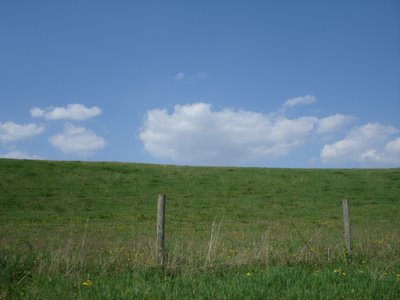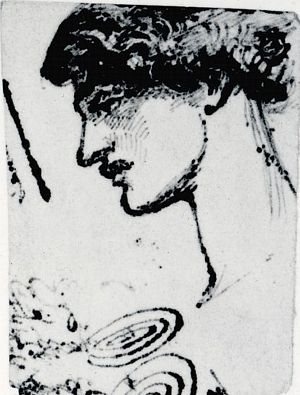Her vagrant mind must be reduced to order.

It's been a long time since I felt really in control of and steady about much of anything, which is one of the reasons I am so faithful about these writings and images: they are a thing that happens daily, period. I know that the first couple of years on an academic job are challenging, and I do love the challenge. But I'm also pretty fatigued a lot of the time, and taking a bit of time to catch my breath always seems to leave me having to run even faster once I start up again. And so I look back over my day and see that I've read a book of Middlemarch for seminar (and found my evening's title therein), watched a film for my Tuesday class, had an essay conference with a student, finished reading an honors thesis, started reading Return of the Native for seminar, and responded to the first few of a batch of reading response papers. And yet I have a pile of things left to accomplish, and a pile-up of meetings and classes and even a college-related road trip to take tomorrow, all before my evening seminar meets.
All of which makes me smile to myself wearily and think, at least this work matters intensely to me. At least nothing I'm doing feels purposeless. At least I get to talk to my young ones more about cultural memory tomorrow; at least I get to discuss the ambivalent-making ending of my favorite novel with the seminarians. At least I get to listen to them prod and pull each other through Hardy's strange visuals of a region whose weirdness they'll be able to grasp, almost, because of where they're studying (and none of them have ever read Hardy, so they're learning a new narrative language even as I type). For example:
At dusk, a man has been watching from afar as a figure stands atop a barrow on a heath in the south of England, when suddenly the figure comes to life and runs down the hill "with the glide of a water-drop down a bud, and then vanishe[s]," justs as a troup of other people ascend the side of the hill:
The only intelligible meaning in this sky-backed pantomime of silhouettes was that the woman had no relation to the party which had taken her place, was sedulously avoiding these, and had come thither for another object than theirs. The imagination of the observer clung by preference to that vanished, solitary figure, as to something more interesting, more important, more likely to have a history worth knowing than these new-comers, and unconsciously regarded them as intruders. But they remained, and established themselves; and the lonely person who hitherto had been queen of the solitude did not at present seem likely to return.And things only get more interesting when you know--as you do, once you reach this passage at the end of Hardy's second chapter--that this observing figure is none other than a man colored all red. His skin, his hair, his clothing--everything, all "a lurid red." He is a reddleman, a seller of redding, red dye with which to mark one's rams' breasts so that the ewes most likely to bear lambs will be marked. See how that works? "He was one of a class rapidly becoming extinct in Wessex," Hardy tells us, "filling at present in the rural world the place which, during the last century, the dodo occupied in the world of animals."
I do not hesitate when people ask me what my favorite Victorian novel is. It's Middlemarch. I don't know when Middlemarch became my favorite novel; it certainly wasn't the first time I read it, when I was forced (through its coexistence in my semester with Richardson's Clarissa) to read more than half the novel in one night. It might have been when I reread it for a teaching assistantship I held at one point. It may simply have grown on me reading after reading. Now I feel it like a revelation every time I pick it up.
But if you were to ask me who my favorite Victorian novelist is, I might have to say Thomas Hardy. There's a quality and intensity of vision in his novels that simply goes unmatched by anyone else, in my experience. George Eliot inspires and bolsters me, showing me how to live; Thomas Hardy enthralls and entrances me, seducing me with the peculiarity of the stern sights and psyches, of the whole and particular world he describes.
All of this is to say that if you read one Hardy novel in high school or in college and you remember him simply as "the pessimistic one," you should give him another try--not least because you might be surprised to find him also to be "the modern one," the one whose works feel psychologically recognizable. I suspect I will have more to say on this point as the week wears on and I continue pushing forward with this strange novel and its strange protagonists. For now, there's all that work to be done.


3 Comments:
Hardy is so delicious. The Woodlanders remains my favorite of those that I've read, even though I remember fairly little of what happened in it (!); I also like Tess a lot, and The Mayor of Casterbridge not so much (as you might recall from our reading group). I've been wanting to pick up Jude the Obscure forever, and The Return of the Native, too... plus, someone whose opinion I trust says that "The Withered Arm" is the best short story in English.
I don't know "The Withered Arm," though I *am* waiting for a particular commenter to chime in with the recommendation that we all read a particular novel about a particular Hand.
I actually love Mayor, and I finally saw The Claim this winter (did I tell you?). i think that The Woodlanders is my favorite too, though, and I seem to recall that you and I had squealing fits when we were reading it and got to the part about the (oh GOD!) mantrap!
Sigh.
That's one of the only things I remember from that text. That, and the strange sunken house and the fence with the blood on it. Of all novelists, Hardy is the one who leaves me with the most resonant (even when totally detached) images.
Someday I'll teach Woodlanders.
Do not reduce all of the vagrant mind as the disorder and discontent is what drives the spirit.
Post a Comment
<< Home